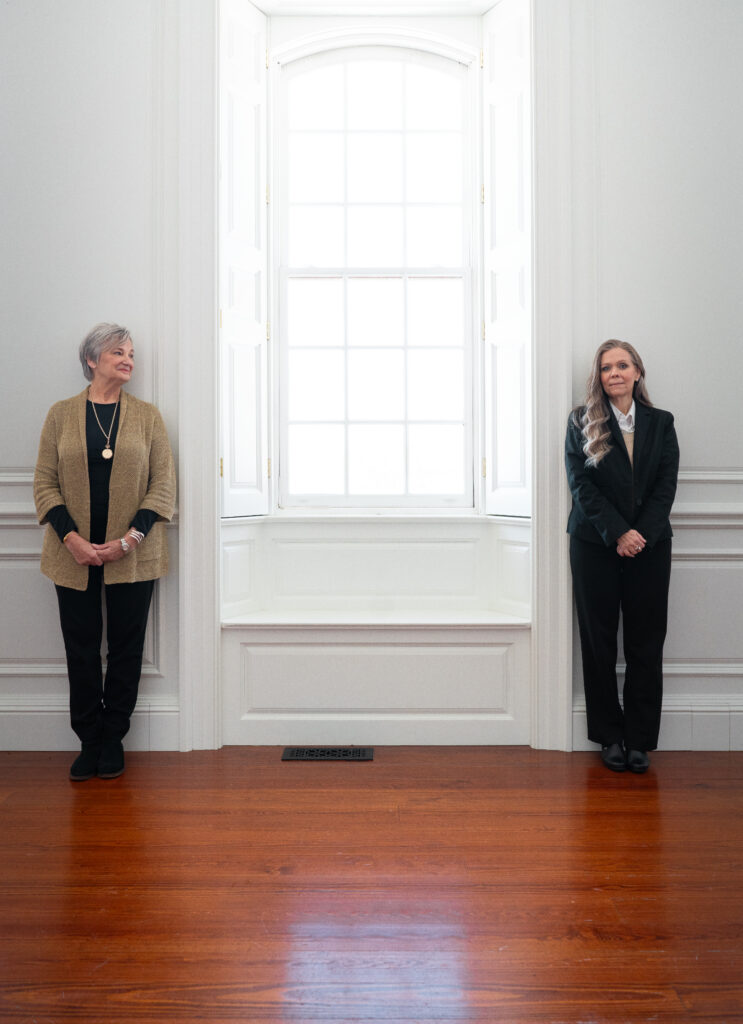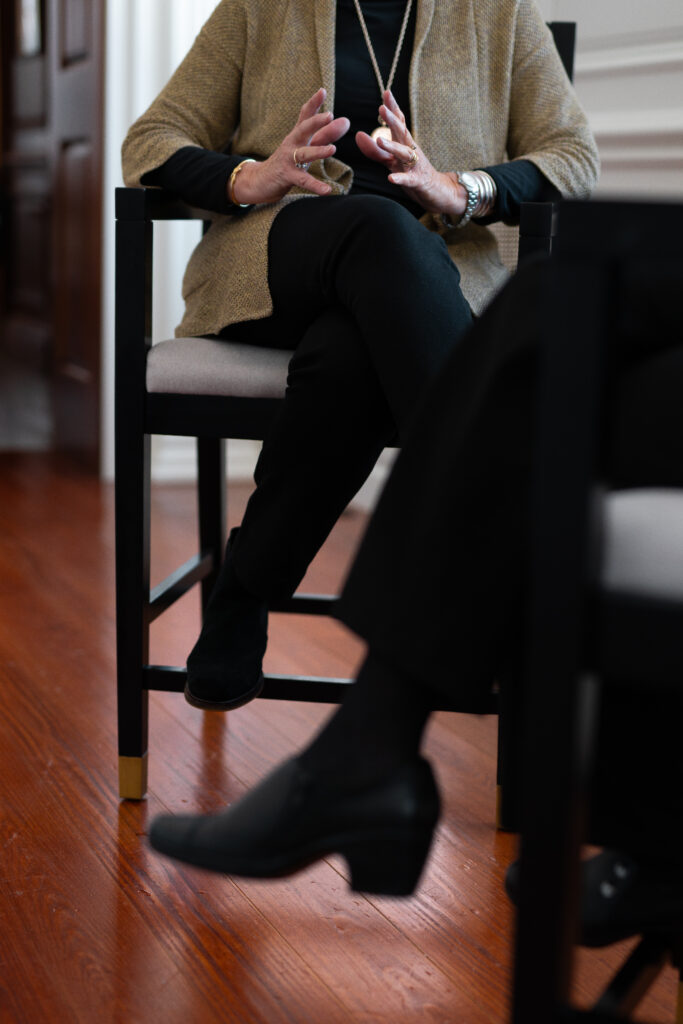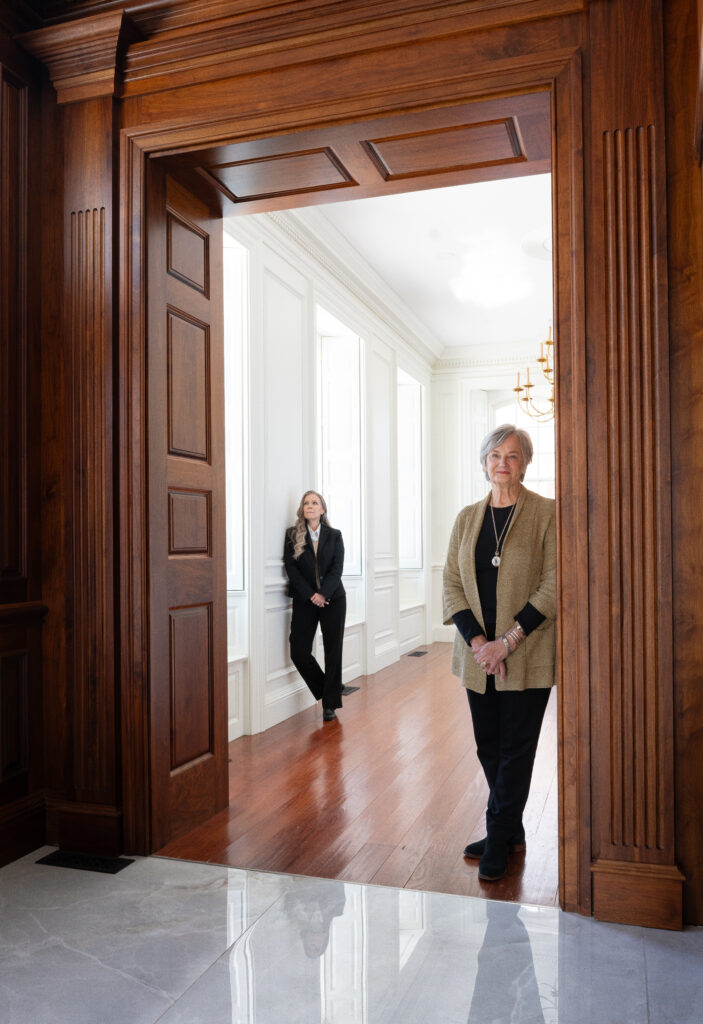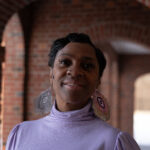Autumn Grim, MPH, CPHA, began working at the Cape Girardeau County Public Health Center in 2019. Prior to that, she had been with the Missouri Health Department for more than 20 years, where she worked as the epidemiologist program coordinator for the state. In 2023, she became the director of the Cape Girardeau County Public Health Center.
Georganne Syler, PhD, has served on the Cape Girardeau County Public Health Centers Board of Trustees, an elected position, for nearly 12 years. She is a retired dietetics professor and a registered dietitian. The two work together to promote public health in Cape Girardeau County and beyond.
Here, Autumn and Georganne discuss the ways public health has changed throughout the past 20 years and why the work they do is important. This conversation has been edited for length and clarity.
Autumn Grim: So, I grew up in Portageville and came to SEMO to get my undergrad. So that’s how I ended up in Cape, and I … met my husband, so I decided to stay here. Ended up going to get my master’s at SLU, Saint Louis University, so I got my Master’s in Public Health and Epidemiology up there, and been here ever since.
Georganne Syler: I met my husband here, too. … We met at SEMO. But we then didn’t live here initially; we went to Kansas City and lived for four years. I have loved being involved with Cape County Public Health Center.
When people say, what does an epidemiologist do? Well, we tell stories. [I] have lots of good stories.
And you collect stories that helps answer the questions.
I hope so. Yeah, lots of stories to tell … one day, maybe I’ll write a book about it.
You should. You should start right now. … You know, time gets away — you’re very young, but time gets away.
Well, you know, public health is very different now than it was 20 years ago. … My first experiences with public health were with the HIV/AIDS epidemic at the time. And back then, of course, there was no treatment for it. … We couldn’t get patients in to see physicians, because physicians wouldn’t see them.
They were so afraid.
Everybody was so afraid. And it was just a completely different time. Most of my clients didn’t make it.
Of course not.
So now, it’s a chronic disease, something that’s managed with meds and that kind of thing, but back then, it was pretty much a death sentence. And so, that was my first experience in public health.
And you were very young.
I was very young, yeah. And to be honest with you, it was heart-wrenching and heartbreaking. And I knew that I loved public health, I knew that’s what I wanted to do, but like I said, every one of my clients passed away. So, I would develop a relationship with them, and then a few months later, they would pass. And so, it was very challenging work. And again, I knew that I wanted to do public health — just wasn’t sure if that was exactly what I wanted to do, so that’s kind of when I decided to go back and get my Master’s and maybe look at infectious disease as a whole, not just HIV, but other things, as well.
We have a wonderful HIV/AIDS clinic that serves around seven counties here in Cape County.
It’s one of the only clinics, actually, in Southeast Missouri. We have about 80 [patients] now. Yeah, ‘cause everybody comes from all over to come and utilize the services. And again, I don’t think people really realize that it is something that’s still needed, and we’re seeing an increase in the number of HIV-positive individuals, unfortunately. Which is sad, because it’s preventable.
Again, another similar success story, miracle success story, is Hep C.
Hep C is actually one of the leading causes of liver failure. Most people don’t know that. Yeah, so now there is a treatment that is really a cure for Hep C, which again, 10 years ago, that would not have entered into the conversation.
I was originally the home economics … teacher. And my interest really, though, was textiles, which is very chemistry-oriented. All of the synthetics come from petroleum. … So anyway, I met this guy in college and he went to law school, and my parents were happy to pay for college, but they said, ‘You will get a job.’ So, of course, I had to get a teaching job. It’s hard to imagine this, but you either taught or were a nurse or a secretary.
I graduated the year Title IX came in, and it really opened the door. It was for athletics, but it really opened the door for many things. Women all the sudden thought, ‘Well, it’s just not a woman’s job to do this and that.’ So anyway, I was going to get my master’s in textiles. Then [my husband] Bill went to law school, and so I taught, put him through law school, and then by that time, I really got interested in nutrition. Which is again chemistry and biology-based. And came back to SEMO because Bill got a job here working at the prosecutor’s office, so then I finished the dietetics — by that time, we had the dietetics program here — so I did the dietetics program, but didn’t do the internship, because you had to go away to do an internship; I had a baby by then.
Kept teaching, I taught textiles, I taught interior design class, I taught child development, you teach all these different things. … As I took more and more nutrition, that was my area. And then went on to Carbondale and got my PhD because I wanted to stay as a tenure-track professor.
Well, it’s actually interesting that you said your background is chemistry, because of course, that’s what my undergrad was in — chemistry with a minor in microphysics. And the thought process there was that I was going to go be a doctor. That was the pre-med track, and that was what I wanted to do.
I actually met a professor there at SEMO … who convinced me that maybe I didn’t want to be a doctor, because they’re on call 24/7, and do you really want to be on call 24/7? So, she introduced me to epidemiology. … I’ve done a lot of work with [Centers for Disease Control and Prevention] CDC, because ultimately, that was kind of where I wanted to end up, was CDC, not so much anymore, but at the time, that’s what I really wanted to do, and I’ve been able to fulfill that goal and that dream. I’ve had an epic career.
And that makes us so fortunate for us here in Southeast Missouri and Cape Girardeau County to have this extremely knowledgeable, experienced woman being our director of public health.
Well, and I have the opportunity to share that, because I also taught, as well. So, I was an adjunct professor there at University of Missouri for seven to eight years, actually, where I taught epidemiology to grad students. … They do have a Master’s in Public Health. … So I helped them with the development of that program.
I told you when I was doing my PhD at Carbondale, I took classes with several people — men — who were going to go on and further their careers at CDC. And they were studying to become epidemiologists, and I was very impressed. I thought, ‘Oh, if I could do what I wanted to do, that would be so exciting.’ I already was in my mid-40s, and I had two little kids, and I was certainly not going to do that. I was happily married — I am happily married still.
The work was hard, but it was worthy. … So yeah, I have no complaints at all about my career. I’ve had experiences that a lot of people won’t ever have and very fortunate to have had the life I had previously before the health department, but also very fortunate to have the experiences that I’ve had while with the health department, as well. Covid was a huge learning experience I think for everyone, even people who had been doing public health for years. It was just a whole new world that we had to step into overnight.
Absolutely. And I would like to say also, we are so thankful [for] Jane Wernsman, who was our former director, and you.
I like to think it was kind of a divine thing, you know, divine intervention, because I came in July of 2019, and it was December when Covid really hit. So, didn’t have much rest period there, really.
We gave out more immunizations in the state initially than any other area, more than Kansas City, more than St. Louis, more than Springfield, because we were so well-organized.
It was a huge effort. There were so many partners that weren’t even recognized who all showed up and helped, but it really was a community effort. And it was something that I’ve never seen in the span of my career and hope to never see it again. … The irony of public health, though, is that Covid, anything else that I’ve ever dealt with in my career, it’s a thankless kind of job. Most people don’t know what we’re doing in the background to keep them safe and healthy, and that’s because we’re doing a good job at it.
When it works, nobody knows about it.
When it works, nobody knows we’re there, and nobody knows what’s going on. But when it doesn’t work, that’s when you see things like Covid.
Or foodborne illness, for example.
We’re doing inspections at restaurants, we’re making sure the water you drink is clean and safe and all kinds of things.
Your septic tanks, your wells.
The child care centers are safe for you to send your children to.
Childcare and hotels, lodging places, nursing homes, on and on and on are all inspected. Don’t we have over 500 —
I’d say closer to 600 restaurants.
That we inspect every year, and repeatedly, if there’s any issues.
This is Autumn Grim’s opinion, but we don’t do a good job of marketing public health. And so, having marketed to the masses to help them understand that without your health, you really don’t have anything else.
My PhD’s actually in something called community health, which is similar to public health, but it’s more hands-on, working with the community. Public health is more administrative on the large-scale definition-wise. … But the theory is when it works, you don’t know about it.
We’re in the background, we’re in the shadows, doing the work that we do.
It’s not all glamorous, by any means.
I would say the vast majority of it is not glamorous. STDs are not glamorous, but it’s necessary for us to provide treatment for those. And right now, that’s another big thing that we’re seeing is syphilis — we’ve seen this huge increase in syphilis cases.
Throughout the country, not just Cape County.
Everywhere. And genital syphilis, which is heartbreaking, because again, that’s preventable. So again, it’s how do you educate the masses that it’s the adage, “An ounce of prevention is worth a pound of cure.” So, what can you do to help people be healthier, to understand that the preventative things long-term are beneficial to you, because you don’t want those severe outcomes.
Or even [something] certainly incredibly important but not glamorous is WIC, Women, Infants and Children. Seeing that pregnant women get good nutrition and vitamins, that their kids get approved.




